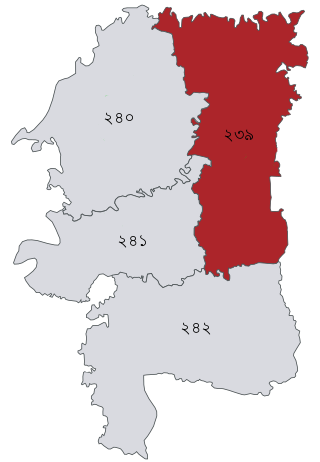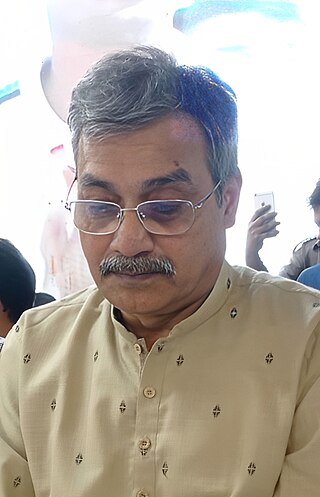Islami Jatiya Oikya Front was a short-lived political alliance in Bangladesh. Formed in 2001, it was one of the three principal contenders in that year's parliamentary elections. Led by the Jatiya Party (Ershad), it also included the Islami Shashontantra Andolan (ISA) and three smaller parties.

Bangladesh elects on national level a legislature with one house or chamber. The unicameral Jatiyo Sangshad, meaning national parliament, has 350 members of which 300 members are directly elected through a national election for a five-year term in single-seat constituencies while 50 memberships are reserved for the women who are selected by the ruling party or coalition. The Prime Minister is the head of the government. The president who is the head of the state is elected by the National Parliament. The president of Bangladesh is a ceremonial post and does not exercise any control over the running of the state.

General elections were held in Bangladesh on 1 October 2001. The 300 seats of the Jatiya Sangsad were contested by 1,935 candidates representing 54 parties and 484 independents. The elections were the second to be held under the caretaker government concept, introduced in 1996.

Mohammed Nasim was a Bangladesh Awami League politician who served as the Minister of Home Affairs and Minister of Health and Family Welfare for the Government of Bangladesh respectively during 1999–2001 and 2014–2019. He was a 6-term Jatiya Sangsad member representing the Sirajganj-1 and Sirajganj-2 constituencies. He was a presidium member of Awami League and the spokesperson of the 14-party alliance.

General elections were held in Pakistan on 7 December 1970 to elect members of the National Assembly. They were the first direct general elections since the independence of Pakistan and ultimately the only ones held prior to the independence of Bangladesh. Voting took place in 300 general constituencies, of which 162 were in East Pakistan and 138 in West Pakistan. A further thirteen seats were reserved for women, who were to be elected by members of the National Assembly.
United Bengal was a proposal to transform Bengal Province into an undivided, sovereign state at the time of the Partition of India in 1947. It sought to prevent the division of Bengal on religious grounds. The proposed state was to be called the Free State of Bengal. A confessionalist political system was mooted. The proposal was not put up for a vote. The British government proceeded to partition Bengal in accordance with the Mountbatten Plan and Radcliffe Line.

General elections were held in Bangladesh on 12 June 1996. The result was a victory for the Bangladesh Awami League, which won 146 of the 300 directly elected seats, beginning Sheikh Hasina's first-term as Prime Minister. Voter turnout was 74.96%, the highest to date. This election was the second to be held in 1996, following controversial elections held in February a few months earlier.

General elections were held in newly independent Bangladesh on 7 March 1973. The result was a victory for the Bangladesh Awami League, who won 293 of the 300 directly elected seats, including eleven constituencies where they were elected unopposed without a vote. Voter turnout was 55%.

Abdul Hamid Khan Bhashani, often shortened as Maulana Bhashani, was a Bengali politician. His political tenure spanned the British colonial India, Pakistan and Bangladesh periods. Maulana Bhashani was popularly known by the honorary title Mozlum Jananeta for his lifelong stance advocating for the poor. He gained nationwide mass popularity among the peasants and helped to build the East Pakistan Peasant Association. Owing to his political leaning to the left, often dubbed Islamic Socialism, he was also called 'The Red Maulana'. He is considered as one of the main pillars of Bangladeshi independence of 1971.
The Jammu and Kashmir Awami League is a political party in the Indian-administered union territory of Jammu and Kashmir. The party was founded by members of different counter-insurgent groups in November 1995. It supports article 370 of the Indian constitution, granting special status to Jammu and Kashmir. The party argues that the people of Jammu and Kashmir have the right to self-determination within the Indian constitutional framework, but not accession to Pakistan nor independence.
Second Revolution was a political hypothesis presented by the "founding father" of Bangladesh, Sheikh Mujibur Rahman. The hypothesis included a series of reforms in the three pillars of a state: administrative, judiciary and legislative systems. The reforms were enacted through the fourth amendment of the constitution of Bangladesh. BaKSAL was formed as the decision making council to carry out the revolution.

Habiganj-1 is a constituency represented in the Jatiya Sangsad of Bangladesh since 2019 by Gazi Mohammad Shahnawaz of the Awami League.

Natore-3 is a constituency represented in the Jatiya Sangsad of Bangladesh since 2008 by Zunaid Ahmed Palak of the Awami League.

Naogaon-5 is a constituency represented in the Jatiya Sangsad of Bangladesh since 2019 by Nizam Uddin Jalil John of the Awami League.

Chapai Nawabganj-1 is a constituency represented in the Jatiya Sangsad of Bangladesh since 2019 by Shamil Uddin Ahmed Shimul of the Awami League.

Dhaka-1 is a constituency represented in the Jatiya Sangsad of Bangladesh since 2019 by Salman F Rahman of the Awami League.

Sirajganj-1 is a constituency represented in the Jatiya Sangsad of Bangladesh since 2024 by Tanvir Shakil Joy of the Awami League.

Harunur Rashid is a Bangladesh Nationalist Party politician and the incumbent Jatiya Sangsad member from the Chapai Nawabganj-3 constituency since January 2019.

Md. Ziaur Rahman is a Bangladesh Awami League politician and the incumbent Jatiya Sangsad member representing the Chapai Nawabganj-2 constituency.
In 2023, by-elections are scheduled to be held for vacant seats in the Jatiya Sangsad, the legislative body of the People's Republic of Bangladesh. In the Jatiya Sangsad, MPs for 300 seats are elected directly and MPs for 50 reserved women seats are elected indirectly by the MPs, thus popular by-elections are only held in the direct seats. As the 11th parliament is scheduled to be expire on 29 January 2024 and the Election Commission has announced to hold the next Bangladeshi general election between late December 2023 to early January 2024, all candidates elected by these by-polls will be members of the 11th Jatiya Sangsad.

















